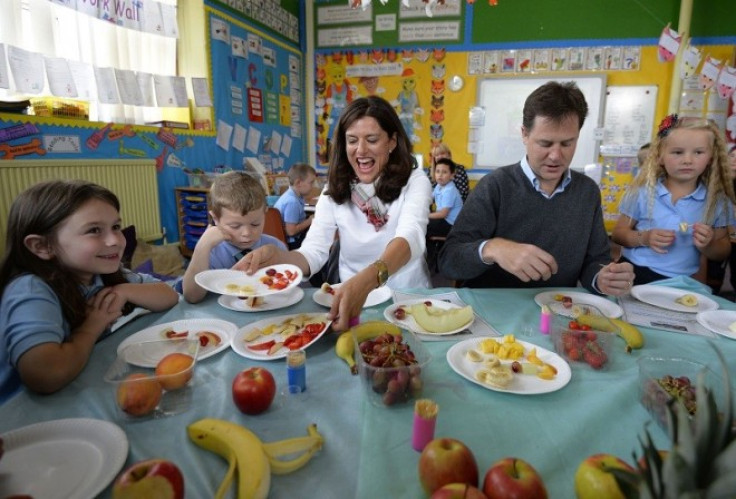Cameron and Clegg Unveil Childcare Help as Chancellor Osborne Prepares Budget

A major announcement offering families up to £2,000 a year towards the cost of childcare has come from David Cameron and Nick Clegg on the eve of a budget expected to focus on the "cost of living crisis".
By jointly announcing the new policy, the two men have attempted to prove the Tory-Liberal Democrat coalition is still functioning, despite the increasingly divisive "differentiation" strategy by both parties as they look towards the 2015 election.
But it is also aimed at heading off the growing attacks, from Tories in particular, that the government is ignoring the hard working, middle income families in its determination to target help on the least well off.
The government hopes the announcement will deflect some of those attacks and distract from the campaign for Chancellor George Osborne to take more higher earners out of the 40p top rate tax band.
Osborne's refusal to do so, however, seems to have popular backing with a YouGov poll for the Sun newspaper suggesting 66% would prefer the government to focus help on the basic rate taxpayers.
Being able to have £2,000 tax relief per child is going to be a huge help to millions of families across Britain.
Labour leader Ed Miliband's decision to concentrate on the cost of living and take the focus away from the improving economy has been prompting claims the government is in danger of ignoring its own core voters by reacting to his agenda.
So the childcare proposal, which could help almost two million working families, is a hugely significant weapon in the coalition's battle to prove they are helping everyone in society and families in particular.
But it has not been as uncontroversial as the government might have hoped. For a start there have been criticisms from Tories that it is restricted to working couples, so families with a stay-at-home parent will not benefit.
Also the fact the allowance will be available to couples earning up to £150,000 a year each has attracted criticism for helping the most well off.
And, because the benefit is a percentage of costs, the full £2,000 will only be available to those paying £10,000 a year for childcare with any family paying less getting smaller amounts.
Clegg admitted that was the case, adding: "People who are on higher than average incomes, yes, they will benefit from this. We decided to do that because, the more we looked at introducing a cut-off point at different income levels, the more complex it became."
Cameron said: "This is about helping all families, but particularly those families that do feel their finances are squeezed. I want to give them greater stability, greater peace of mind, greater security. And obviously being able to have £2,000 tax relief per child is going to be a huge help to millions of families across Britain."
Under the new proposal, which will not come into effect until after the 2015 general election, parents will be able to claim a 20% rebate on care costs up to £10,000 a year for all children aged up to 12.
Also, anyone working part-time and earning more than £50 a week, parents on maternity, paternity and adoption leave and those starting their own business will be entitled to support in the first year.
The move received a warm response from target groups such as Mumsnet and the Family and Childcare Trust, but Labour's Lucy Powell, while welcoming any help with childcare costs, said the government had already cut support for children and families by £15bn.
"And today the prime minister confirms that no help will arrive until after the election. This is too little, too late," she said.
The announcement also raises another question over exactly what surprises the chancellor will be able to pull out of his budget box to snatch the headlines on Wednesday.
© Copyright IBTimes 2024. All rights reserved.






